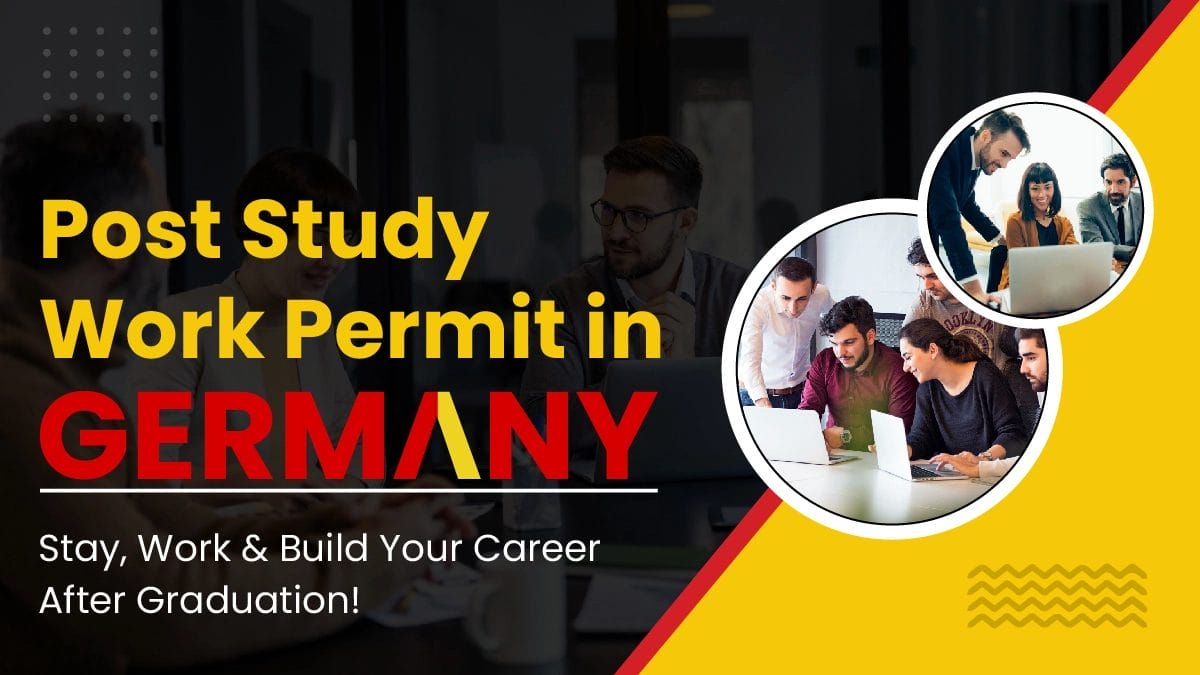
If you’ve recently graduated from a German university, you might be wondering what’s next. The post study work permit in Germany is your golden ticket to kickstarting a career in one of Europe’s strongest economies. This permit allows you to stay in the country for up to 18 months after graduation to explore job opportunities. You don’t need a job offer right away, which gives you the freedom to find the right fit for your skills.
Why is this so important? It opens doors to stable jobs, good pay, and global networking. According to Germany’s Federal Employment Agency, around 60% of non-EU graduates successfully transition to full-time employment. With options like the EU Blue Card or a residence permit for skilled workers, this visa can be your first step toward a thriving career and even permanent residency.
The post-study work visa is a game-changer for students aiming to build a future in Germany.
The post-study work permit lets graduates stay in Germany for 18 months to find a job that fits their skills.
You don’t need a job offer to apply, so you can explore different options freely.
To apply, you must meet requirements like having a degree from a German university and showing you have enough money to support yourself.
Start looking for jobs early and use university career services to meet employers and improve your chances of getting hired.
Working in Germany can help you stay there permanently, making this permit an important step for your future.

The post study work permit in Germany is designed to help you transition smoothly from student life to professional life. After completing your studies, this permit allows you to stay in Germany for up to 18 months. During this time, you can explore job opportunities that align with your academic background and career goals.
What makes this permit so valuable? It gives you the freedom to work in any capacity—whether part-time or full-time—without needing additional formalities. This flexibility means you can focus on finding the right job in your field without feeling rushed.
Here’s what the post-study work visa offers:
This permit isn’t just about finding a job; it’s about building a future. Whether you’re aiming for a role in engineering, IT, healthcare, or another sector, this visa opens the door to endless possibilities.
For international students, the post-study work visa is a game-changer. It allows you to apply the knowledge you gained during your studies in real-world settings. This hands-on experience not only boosts your employability but also helps you develop skills that employers value.
Germany’s strong economy and demand for skilled workers make it an ideal place to start your career. With this permit, you can explore roles in industries facing skill shortages, such as technology, manufacturing, and healthcare. In fact, around 60% of non-EU graduates successfully transition to full-time jobs after using this permit.
The benefits don’t stop there. Gaining work experience in Germany can also pave the way for permanent residency. By building your professional network and enhancing your skills, you’re setting yourself up for long-term success.
Tip: Start your job search early and take advantage of career services offered by your university. These resources can help you navigate the job market and connect with potential employers.
To apply for a post study work permit in Germany, you need to meet specific academic requirements. First, you must have successfully completed a degree program at a recognized German university or academic institution. Whether you’ve earned a bachelor’s, master’s, or doctoral degree, the key is that your qualification comes from an accredited institution.
This requirement ensures that your education aligns with Germany’s high academic standards. If you’ve graduated from a German university, you’re already on the right track. The permit is available to students who have completed their studies in Germany, giving you up to 18 months to explore job opportunities.
Tip: Keep your graduation certificate handy. It’s one of the essential documents you’ll need during the application process.
Germany places a strong emphasis on financial stability and health coverage. To qualify for the post study work permit, you must prove that you can support yourself financially during the 18-month period. This means showing evidence of sufficient funds in your bank account or a financial guarantee.
Health insurance is equally important. You’ll need valid health coverage to ensure you’re protected while living in Germany. If you were covered under student health insurance during your studies, check if it’s still valid or switch to a private plan.
Note: Financial proof and health insurance are non-negotiable. Without them, your application won’t move forward.
Your current residence status also plays a crucial role. To apply for the post study work permit, you must hold a valid residence permit or student visa. This ensures that you’re legally allowed to stay in Germany while transitioning from student life to professional life.
If your student visa is about to expire, don’t worry. You can apply for the post study work permit before it runs out. Just make sure your application is submitted on time to avoid any legal complications.
Tip: Double-check the expiration date on your visa or residence permit. Early preparation can save you from unnecessary stress.
When applying for a post-study work permit in Germany, you’ll need to meet a few additional requirements. These might seem small, but they’re just as important as your academic qualifications and financial proof. Let’s break them down so you’re fully prepared.
You must provide proof of your current address in Germany. This is usually done through a document called the Meldebescheinigung (registration certificate). You can get this by registering your address at the local registration office (Bürgeramt).
Tip: If you’ve recently moved, make sure to update your address before applying. The process is quick and ensures your application isn’t delayed.
You’ll need to show that you’re actively seeking employment in your field of study. While you don’t need a job offer yet, having a clear plan can strengthen your application.
This could include:
Note: Highlighting your career goals shows that you’re serious about contributing to Germany’s workforce.
Although not mandatory, knowing German can give you an edge. Many employers prefer candidates who can communicate in German, especially for roles that involve client interaction.
If you’ve taken any language courses, include your certificates. Even basic proficiency can make a difference.
You must have a clean legal record. Any violations during your stay in Germany could impact your application. Ensure you’ve followed all visa regulations and avoided overstaying your student visa.
Reminder: Staying compliant with German laws reflects your responsibility and commitment to living in the country.
By meeting these additional requirements, you’ll make your application stronger and increase your chances of approval. Take the time to gather these documents and prepare thoroughly. It’s all about showing that you’re ready to take the next step in your career journey.
Before you start the application process, gather all the necessary documents. Having everything ready will save you time and reduce stress. Here’s a checklist of what you’ll need:
Other documents you might need include a completed application form, passport-sized photographs, proof of accommodation, and a clean criminal record. Double-check the requirements with your local Foreigners’ Office to avoid missing anything.
Tip: Organize your documents in a folder. This will make it easier to access them during your appointment.
Once your documents are ready, the next step is to book an appointment with the Foreigners’ Office (Ausländerbehörde). Appointments can fill up quickly, so it’s best to schedule yours as early as possible. You can usually do this online or by visiting the office in person.
Make sure you’ve completed all the necessary forms and have your documents organized before the appointment. This will help the process go smoothly and show that you’re well-prepared.
Note: If you’re unsure about the process, your university’s international office can guide you.
On the day of your appointment, bring all your documents and submit your application. The officer will review your paperwork and may ask a few questions about your plans in Germany. Be polite and confident during this interaction.
If everything is in order, your application will move forward. You’ll either receive your post-study work visa immediately or get a notification about when to collect it. Keep the receipt or confirmation slip they give you, as it’s proof that your application is being processed.
Reminder: Processing times can vary, so apply well before your current visa expires.
Sometimes, the Foreigners’ Office might ask you to attend an interview as part of your application process. Don’t worry—this is usually straightforward. The purpose of the interview is to confirm your intentions and ensure you meet all the requirements for the post-study work permit.
Here’s how you can prepare:
Tip: Bring a copy of your documents to the interview. It’s always better to have them handy in case the officer needs to verify something.
Not all applicants are called for an interview, but if you are, think of it as an opportunity to showcase your readiness to contribute to Germany’s workforce.
Once your application is approved, you’ll receive your post-study work permit. This is the moment you’ve been waiting for! The permit allows you to stay in Germany for up to 18 months while you search for a job that matches your qualifications.
Here’s what happens next:
Reminder: The 18-month period starts from the date on your graduation certificate, not the date you receive the permit. Plan accordingly to make the most of your time.
Congratulations! Receiving your post-study work permit is a big step toward building a successful future in Germany. Use this opportunity to explore, grow, and achieve your career goals.
Getting your post-study work visa approved starts with good preparation. Begin the process as soon as you receive your final exam results. This gives you enough time to gather all the required documents and avoid last-minute stress. Keep a checklist handy to track what you’ve completed and what’s still pending.
Organizing your paperwork is key. Use a folder or digital storage to keep everything in one place. This includes your graduation certificate, financial proof, health insurance, and residence permit. Staying organized not only saves time but also ensures you don’t miss anything important.
Tip: Set reminders for deadlines. Missing one could delay your application.
Before submitting your application, go through your documents carefully. Even small errors can cause delays. Check that your graduation certificate is accurate and your financial proof meets the required amount. Make sure your health insurance is valid and your passport isn’t close to expiring.
It’s also a good idea to review the application form. Ensure all fields are filled out correctly. If you’re unsure about any section, ask for help. Double-checking everything shows you’re serious about staying in Germany and starting your career.
Reminder: Bring extra copies of your documents to your appointment. It’s better to have more than you need.
Your university’s international office or career services can be a great resource. They’ve helped many students like you navigate the visa process. Reach out to them for advice on preparing your application or understanding the requirements.
They can also connect you with workshops or seminars about job searching in Germany. These events often provide tips on writing resumes, preparing for interviews, and networking. Taking advantage of these resources can make your transition smoother.
Note: Don’t hesitate to ask questions. The staff is there to support you.
Timing is everything when it comes to your post-study work permit application. Missing a deadline or underestimating processing times can throw a wrench in your plans. That’s why staying ahead of the clock is crucial.
The processing time for post-study work permits in Germany usually takes between 1 to 3 months. This timeline depends on how busy the Foreigners’ Office (Ausländerbehörde) is and whether your documents are complete. Submitting your application early gives you a buffer in case of unexpected delays.
Tip: Don’t wait until your student visa is about to expire. Start the process as soon as you receive your final exam results or graduation certificate.
To keep things on track, create a timeline for your application. Here’s a simple plan to follow:
Reminder: The 18-month period for your post-study work permit starts from the date on your graduation certificate, not the date you apply. Don’t lose valuable time by delaying your application.
Keep an eye on your email and mailbox after submitting your application. The Foreigners’ Office will notify you if they need additional documents or when your permit is ready for collection. Respond promptly to avoid further delays.
By staying organized and proactive, you’ll navigate the process smoothly. Remember, preparation is your best friend when dealing with deadlines and processing times.

Now that you’ve got your post-study work visa, it’s time to focus on finding the right job. Germany offers plenty of opportunities, but having a strategy can make all the difference. Here are some tips to get started:
Germany’s strong economy and demand for skilled workers mean you’re in the right place to start your career. Stay proactive and keep refining your approach.
Your post-study work visa is just the beginning. To stay in Germany long-term, you’ll need to transition to a work visa or even permanent residency. Here’s how you can do it:
Remember, you must act within the 18-month period of your post-study work visa. If you don’t transition to a work visa or permanent residency, you’ll need to leave Germany once your visa expires.
Germany provides plenty of resources to help you grow professionally. Take advantage of these to build a successful career:
By using these resources, you can gain valuable experience, build your network, and set yourself up for long-term success. Germany’s clear pathway to permanent residency is another advantage, making it easier for you to plan your future.
The post study work permit in Germany is more than just a visa; it’s your gateway to applying your academic knowledge in real-world settings. It boosts your employability while contributing to Germany’s economy by integrating skilled international graduates into its workforce. With this permit, you can explore job opportunities, gain valuable experience, and even take steps toward permanent residency.
Preparation is key to a smooth application process. Start early, stay organized, and double-check your documents. Use resources like university career services to guide you through each step. Remember, this is your chance to build a successful career in a country that values innovation and talent.
Over 6.3 million international students contributed USD 370 billion to the global economy in 2020. Countries like Germany offer post-study work visas to attract and retain talent.
Take advantage of this opportunity. With the right planning and support, you can turn your aspirations into reality.
You can stay in Germany for up to 18 months after graduation with this visa. The countdown starts from the date on your graduation certificate, so plan your job search accordingly.
Tip: Use this time wisely to explore job opportunities and build your career.
Yes, you can apply before your student visa expires. Just ensure you meet all the requirements and submit your application on time to avoid legal issues.
Reminder: Early preparation is key. Don’t wait until the last minute to start the process.
No, you don’t need a job offer to apply. This visa gives you the freedom to search for a job that matches your qualifications during the 18-month period.
Note: Showing active job search efforts can strengthen your application.
It’s not mandatory, but knowing German can give you an edge in the job market. Many employers prefer candidates who can communicate in German, especially for client-facing roles.
Tip: Even basic German skills can make a big difference. Consider taking a language course.
Yes, you can. Once you secure a qualifying job, you can apply for a work visa or the EU Blue Card. After meeting residency requirements, you can apply for permanent residency.
Reminder: Keep track of your visa timeline to ensure a smooth transition.
